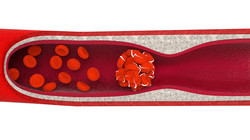New treatment for heart disease
Heart disease kills more people worldwide than any other cause of death. Coronary heart disease begins with damage to the arteries that pump blood to and from the heart. Plaque, made up of fats and cholesterol, builds up where the arteries are damaged, narrowing them and reducing blood flow. If plaques rupture, blood cells called platelets stick to the injury site, creating blood clots which can block flow to the heart, causing a heart attack. The EU-funded ANTCARD (Analogues of thromboxane for the treatment of cardiovascular disease) project aimed to develop new treatments for heart disease. Currently, at-risk patients are prescribed anti-platelet medication to stop blood clots forming. These blood-thinning drugs, which include aspirin and clopidogrel, can have nasty side effects. Aspirin thins the blood by blocking production of thromboxane, a compound that promotes blood clotting. The biochemical pathway that makes thromboxane also produces prostaglandins that protect the mucosal lining of the stomach. Thus, side effects of aspirin include severe gastric problems such as ulcers. Researchers devised a way to block the platelet-activating thromboxane without affecting prostaglandin production. Rather than blocking the biochemical pathway that produces thromboxane and prostaglandins, they developed antibodies that bind to thromboxane and inactivate it. Researchers started by making stable, synthetic versions of thromboxane which they could then use for raising antibodies. Apart from producing thromboxane to develop antibodies against it, the methods developed can also be used to produce prostaglandin-based drugs. ANTCARD provided a starting point towards developing new drugs to treat heart disease with fewer side effects. Since 47 % of all deaths in Europe are caused by cardiovascular diseases, this could have a major impact on both society and the pharmaceutical industry.







